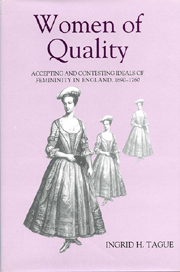Book contents
Introduction
Published online by Cambridge University Press: 12 September 2012
Summary
[S]he considers her Husband as her Steward, and looks upon Discretion, and good House-Wifery, as little domestick Virtues, unbecoming a Woman of Quality. She thinks Life lost in her own Family, and fancies her self out of the World when she is not in the Ring, the Play-House, or the Drawing-Room: She lives in a perpetual Motion of Body, and Restlessness of Thought, and is never easie in any one Place when she thinks there is more Company in another. The missing of an Opera the first Night, would be more afflicting to her than the Death of a Child. She pities all the valuable Part of her own Sex, and calls every Woman of a prudent modest retired Life, a poor-spirited, unpolished Creature. What a Mortification would it be to Fulvia, if she knew that her setting her-self to View is but exposing her self, and that she grows Contemptible by being Conspicuous.
With this verbal portrait of “Fulvia,” first published in March 1711, Joseph Addison described the woman that didactic authors of the early eighteenth century most hated and feared: the woman of fashion. In his scathing portrayal, Fulvia overturns all the rules that were supposed to govern women's lives. Rather than obeying her husband, she treats him as her servant. Rather than caring for her family, she is bored at home and has so little feeling for her children that their death would cause her less grief than missing opening night at the opera.
- Type
- Chapter
- Information
- Women of QualityAccepting and Contesting Ideals of Femininity in England, 1690–1760, pp. 1 - 17Publisher: Boydell & BrewerPrint publication year: 2002



